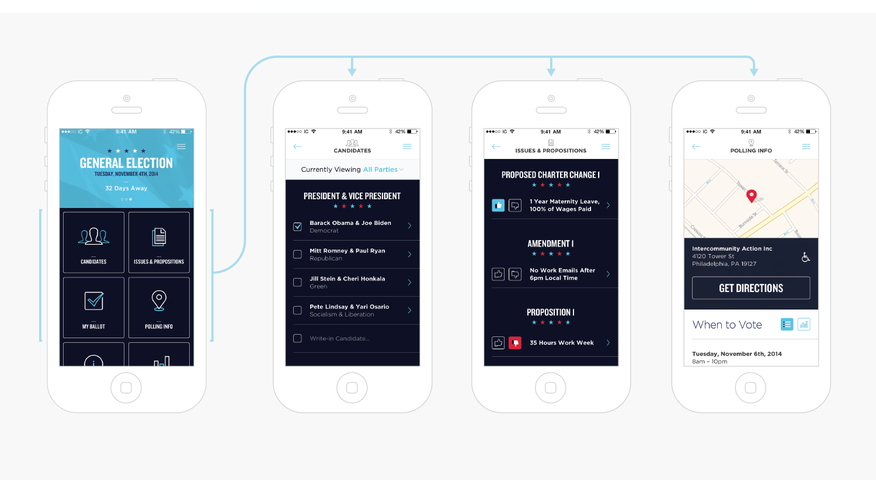Smartphone apps play role in midterm elections
16:37 As voters hit the polls today, some have been turning to smartphone apps to help make sense of the candidates and issues at play during what has been a particularly contentious midterm election cycle.
As voters hit the polls today, some have been turning to smartphone apps to help make sense of the candidates and issues at play during what has been a particularly contentious midterm election cycle.
Various groups from across the political spectrum — Republicans to Democrats, to those choosing to remain nonpartisan – have developed a range of apps for those involved in the election process, from voters to polling center volunteers. With smartphone apps becoming increasingly more prevalent in all aspects of daily life, it is only natural that their role will continue to grow in future elections, according to Rob Tannen, director of design and strategy at the Intuitive Company, which recently developed Intuitive Voting, a prototype app geared to “improve the election process.”
“You think the presence of apps in the political process would have happened more aggressively by now than it has,” Tannen told FoxNews.com. “Going forward, I think there is the infrastructure in place for more people to get the right information at the right time.”
While still in its conceptual phase, Intuitive Voting is the kind of app that Tannen said he hoped would help improve the voting process in future election years. Designed as two separate apps – one used by polling center volunteers and the other for actual voters — Intuitive Voting’s features include clear, concise information on volunteer protocol, a tool to help people register to vote, and detailed information on candidate platforms. The app was recently the winning design in the Human Factors and Ergonomics Society’s 2014 voting Design Competition.
Tannen said the team’s vision for the app is for it to be a nonpartisan tool that provides objective information to voters and volunteers. While not yet a reality, he said that tools like Intuitive Voting are necessary in helping voters make sense of the barrage of information they get on a daily basis from campaigns and interest groups.
There are currently several apps in existence that attempt to help voters determine who they should vote for this election season. For example, Votr, developed by media company Vocativ, is an election app that takes a few cues from popular dating app Tinder. Votr gives users the opportunity to assess each of the 161 candidates vying for the 36 open U.S. Senate seats in Tuesday's elections. Users answer several emoji-animated personal questions – some are issue-based, like whether or not one supports gay marriage, to the more trivial, like whether a user is a dog or cat person – and then presents candidates who users can vote yes or no for. If the candidate’s answers match those of the user’s, then he or she will most likely get a decided “yes.”
For example, when Emily Marie Sanchez, 2014 Texas-based Green Party candidate for the U.S. Senate, pops up on the app, her positions like “pro-choice,” “supports stricter gun laws,” and “supports marijuana law reform” appear under her profile picture in addition to a few quick facts. After looking at her overview, the app’s user has the option to swipe yes or no.
While the Intuitive Voting and Votr apps were developed by nonpartisan organizations, various interest groups from both the right and the left have been applying app technology to try to make an impact during today’s elections. True the Vote, a Texas-based conservative group, has an app called VoteStand for both iOS and Android phones that is designed to allow users to “report cases of potential election irregularity and fraud.” According to True the Vote’s website, the geo-location-based app’s users are encouraged to report incidents like “absentee voting fraud,” “machine tampering,” or “voter intimidation” by taking photos or writing posts that will be submitted to True the Vote. The conservative nonprofit will post users' submissions that have been vetted and potentially contact local polling officials about alleged incidents of voting fraud.
The current version of the app was released last week, and Logan Churchwell, True the Vote’s communications director, told FoxNews.com that it currently has around 10,000 users. Churchwell said that, so far, the app has been downloaded the most in Texas, California, and Florida, and does not collect information such as a user’s party affiliation. Of course, given the fact that all of VoteStand’s content is crowd sourced, it is important that users avoid breaking any voting laws. The group lists on its website guidelines and suggestions for the app’s users. For instance, users have to be clear that they are not violating the state rules for shooting video and taking photographs inside polling locations, as well as potentially intimidating any fellow voters. Criminal penalties could result from violating voting laws.
With such increased interest in inserting apps into the election process, one natural question immediately comes up – will online voting ever become a reality in an increasingly digitized world?
Tannen said it is a possibility that will take a while to become a reality.
“You have real app designs for financial services and the banking industry, and obviously people are very safely and easily processing confidential transactions online and on phones,” he explained. “Obviously that could be applied to voting down the line. All of the technology is there, the infrastructure is there, but the question comes down to money, and organizations like local governments that are responsible for voting machines. It involves local money. To bring the voting process online, it is probably going to be driven by the private sector down the line.”


0 comments